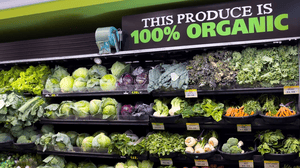A forum for contributed pieces from industry thought leaders, retailers, wholesalers and manufacturers. The views expressed are those of the authors.
Discovering Three Sustainability Disconnects
Sustainability’s remarkable advancement in the food industry owes a lot to champions who made very clear cases about its benefits.
November 3, 2012
Sustainability’s remarkable advancement in the food industry owes a lot to champions who made very clear cases about its benefits.
But we’ve learned that not everything is clear about sustainability.
 Recently a few surprises — actually disconnects — emerged around this topic during the Food Marketing Institute/Grocery Manufacturers Association Sustainability Summit in Washington D.C. Here are three of them:
Recently a few surprises — actually disconnects — emerged around this topic during the Food Marketing Institute/Grocery Manufacturers Association Sustainability Summit in Washington D.C. Here are three of them:
1. Consumers want transparency, but actually not too much. For a while it seemed consumers wanted all the sustainability details. But retailers such as Kroger have learned the limits of this thinking.
“Transparency is crucial in this space,” Nate Shepley Streed, Kroger’s sustainability manager, Corporate Brands, told summit attendees.
However, he added, while some “engaged customers” want lots of information, “you don’t want to over-communicate, whether on packaging or in-store, to someone who just wants to run in and get what they want and won’t be influenced in their purchasing decision by this information.”
2. We need to feed an exploding global population, but we still discard a huge amount of food. Guests at the summit heard this factoid over and over: by 2050 the global population will surge to about 9 billion people, which means a lot of mouths to feed. However estimates are that 80 billion pounds of food waste is being sent to landfills each year in the U.S., despite the fact that much of it could be diverted to productive uses. The industry is engaged in a three-year initiative to increase the amount of food donated for anti-hunger efforts and reduce the amount of food sent to landfills, but even more needs to be done.
3. Millennials are thought of as progressive on sustainability, but that’s not necessarily the case. One of the most surprising summit presentations showed how Millennials often don’t live up to their image as environmentally conscious. Scott Mushkin, a financial analyst with Jefferies & Co., discussed the sustainability implications of his company’s study, noting that many of these younger consumers are willing to forgo certain environmental best practices in favor of convenience, especially as it relates to products they buy.
The disconnects that emerged at the summit aren’t necessarily bad. For the most part they are about confusing behaviors and executions, but, fortunately, they don’t indicate a rethinking of the need to embrace sustainability in the first place.
About the Author
You May Also Like






